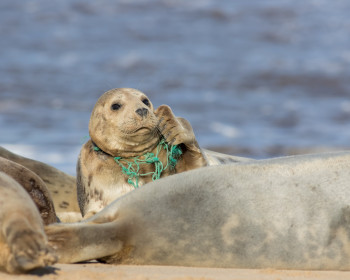Advocating for Lolita
Open gallery

By Professor Delcianna Winders
For forty-nine years the Miami Seaquarium has held a beautiful, intelligent, and highly sociable orca named Lolita in the smallest, most decrepit orca tank in the world, without the company of a single other orca. Many advocates have worked on Lolita’s behalf since she was stolen from her family as a baby off the coast of Washington forty-nine years ago this week. I’m proud to be one of them.
Before joining the Center for Animal Law Studies (CALS) this summer to launch and direct the world’s only animal law litigation clinic–and only clinic focused exclusively on farmed animal issues–I had the honor of representing a coalition including the Orca Network, Orca Network director Howard Garrett, People for the Ethical Treatment of Animals, and the Animal Legal Defense Fund in litigating numerous lawsuits on Lolita’s behalf. These suits sought to hold both the Miami Seaquarium and the federal government accountable under the Endangered Species Act and the Animal Welfare Act, two laws that are supposed to protect Lolita but that, as a result of lax enforcement, have failed her miserably.
Though Lolita is now more than fifty years old, she could still have many vibrant years ahead if transferred to a seaside sanctuary in her home waters. Indeed, the orca who is believed to be Lolita’s mother is still alive and living in her natural environment where she is now in her 80s. You can read my recent interview with the Willamette Week about why Lolita deserves to come home here.
“Liberation 4 Lolita” rallies around the world last month organized by the “Until Lolita Is Home” campaign left no question that Lolita’s advocates are more plentiful, strong, and hopeful than ever. I spoke at the downtown Portland rally, giving an overview of the litigation on behalf of Lolita that I’ve been involved in, and then joined my colleagues from the Aquatic Animal Law Initiative, Professor Kathy Hessler and law fellow Amy Wilson, on campus for a screening of the documentary Lolita: Slave to Entertainment and an in-depth legal discussion—organized by Lewis & Clark law student Madison Steffey, who was inspired by Lolita’s plight to become a lawyer.
Thankfully, there is reason to be optimistic about Lolita’s plight. The coalition that I previously represented continues its efforts for Lolita, and will soon be filing an appeal in the U.S. Court of Appeals for the Eleventh Circuit. After years of automatically renewing Animal Welfare Act licenses for facilities that aren’t compliant with minimum welfare standards—the policy that was the focus of the first suit we filed on Lolita’s behalf, as well as numerous other suits I have litigated and a law review article that I published last year—the U.S. Department of Agriculture has officially proposed doing away with automatic license renewals. And members of the Lummi Nation are seeking Lolita’s return to her family and her home waters under the Native American Graves and Repatriation Act. Moreover, the public is engaged and supportive of eliminating the plight of orcas like Lolita who are forced to live their lives in an unnatural captivity that deprives them of the ability to exercise their most basic natural instincts. For example, Canada’s Senate and House recently passed the Ending the Captivity of Whales and Dolphins Act. Former Sen. Wilfred Moore of Nova Scotia, who first introduced the measure in 2015, described phasing out such captivity as a “moral obligation.” I couldn’t agree more.
In my career, I have worked with many talented litigators and advocates to secure the transfer of more than 100 bears, tigers, chimpanzees, and other captive wild animals to reputable sanctuaries. The transformations these animals have undergone following their transfers—even at advanced ages—give me hope for Lolita and remind me how important it is to secure her return home and to advocate for other animals, including the billions of animals painfully mutilated and tightly confined in factory farms.
With the fall semester just a few weeks away, I look forward to launching the Animal Law Litigation Clinic at CALS and building on my many years of advocacy on behalf of Lolita and countless other animals to train the next generation of animal lawyers to pursue this critically important work.
The views expressed above are those of the author and not necessarily those of Lewis & Clark Law School.
More Center for Animal Law Studies Stories
Center for Animal Law Studies is located in Wood Hall on the Law Campus.
MSC: 51
email cals@lclark.edu
voice 503-768-6960
Center for Animal Law Studies
Lewis & Clark Law School
10101 S. Terwilliger Boulevard MSC 51
Portland OR 97219

